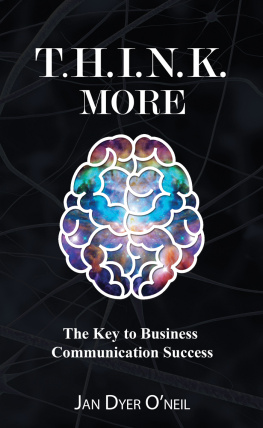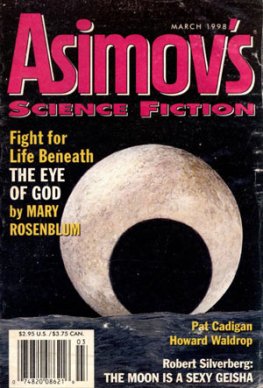Jan Dyer O’Neil - T.H.I.N.K. More
Here you can read online Jan Dyer O’Neil - T.H.I.N.K. More full text of the book (entire story) in english for free. Download pdf and epub, get meaning, cover and reviews about this ebook. year: 2018, publisher: Morgan James Publishing, genre: Home and family. Description of the work, (preface) as well as reviews are available. Best literature library LitArk.com created for fans of good reading and offers a wide selection of genres:
Romance novel
Science fiction
Adventure
Detective
Science
History
Home and family
Prose
Art
Politics
Computer
Non-fiction
Religion
Business
Children
Humor
Choose a favorite category and find really read worthwhile books. Enjoy immersion in the world of imagination, feel the emotions of the characters or learn something new for yourself, make an fascinating discovery.
- Book:T.H.I.N.K. More
- Author:
- Publisher:Morgan James Publishing
- Genre:
- Year:2018
- Rating:3 / 5
- Favourites:Add to favourites
- Your mark:
- 60
- 1
- 2
- 3
- 4
- 5
T.H.I.N.K. More: summary, description and annotation
We offer to read an annotation, description, summary or preface (depends on what the author of the book "T.H.I.N.K. More" wrote himself). If you haven't found the necessary information about the book — write in the comments, we will try to find it.
T.H.I.N.K. More — read online for free the complete book (whole text) full work
Below is the text of the book, divided by pages. System saving the place of the last page read, allows you to conveniently read the book "T.H.I.N.K. More" online for free, without having to search again every time where you left off. Put a bookmark, and you can go to the page where you finished reading at any time.
Font size:
Interval:
Bookmark:
The Key to
Business Communication
SUCCESS
by
Jan Dyer ONeil
T.H.I.N.K. More
The Key to Business Communication SUCCESS
2018 Jan D. ONeil
All rights reserved. No portion of this book may be reproduced, stored in a retrieval system, or transmitted in any form or by any meanselectronic, mechanical, photocopy, recording, scanning, or otherexcept for brief quotations in critical reviews or articles, without the prior written permission of the publisher.
Published in New York, New York, by Morgan James Publishing. Morgan James is a trademark of Morgan James, LLC. www.MorganJamesPublishing.com
The Morgan James Speakers Group can bring authors to your live event. For more information or to book an event visit The Morgan James Speakers Group at www.TheMorganJamesSpeakersGroup.com.
ISBN 9781630475857 paperback
ISBN 9781630475864 eBook
Library of Congress Control Number: 2015902713
Illustrations: Pages 20, 49, 77, 87, 92, 138, and 144 illustrations by Frank Ramspott (iStock by Getty Images). Page 23 illustration by Patrick W. Dennis. Pages 30, 32, 85, and 110 illustrations by Adam Dunn. Page 62 illustration by LEOcrafts (iStock). Page 134 illustration by Owattaphotos (iStock). Pages 45, 73, 89, 105, and 114 illustrated by the author.
Editors: Diane Giombetti Clue and Michelle Gaudet
Photograph of Jan Dyer ONeil: Glenn Geise
Book Cover Design: Patrick W. Dennis
Interior Design: Patrick W. Dennis

In an effort to support local communities, raise awareness and funds, Morgan James Publishing donates a percentage of all book sales for the life of each book to Habitat for Humanity Peninsula and Greater Williamsburg.
Get involved today! Visit
www.MorganJamesBuilds.com
To the special men of my life
Brooks, Chad, Logan, and Peter
Thank you for your love and support
Special thank you for believing in me
Melissa Christenson, Joan C. Johnson, Cindy ONeil,
Alan Pasnik, Charles and Nancy Sweetman,
Bonnie and Steve Tragakis
I very rarely think in words at all. A thought comes, and I may try to express it in words afterwards.
Albert Einstein
Im a great believer that any tool that enhances communication has profound effects in terms of how people can learn from each other, and how they can achieve the kind of freedoms that theyre interested in.
Bill Gates
Technology is nothing. Whats important is that you have a faith in people, that theyre basically good and smart, and if you give them tools, theyll do wonderful things with them.
Steve Jobs
Machines might give us more time to think but will never do our thinking for us.
Thomas J. Watson Jr.
Y oure lucky. Youre not living one hundred years ago when your only choices of communication were a meeting, letter, or telephone call. We are very fortunate to have many means of sharing information. Imagine, you can post your thoughts to the world, Facetime with someone halfway around the world, and send an e-mail to millions throughout the world. Electronics have empowered us with astounding communication tools, which have immensely improved how we interact and thrive. Can we use these tools better? The answer is yes. We know more today in neuroscience and psychology about how we work to improve how we work . How can communication nirvana be achieved? The answer is not found looking forward to the futurethe answer lies in taking a step backward before BC.
We havent changed much. Whats the difference between you and our primitive ancestors? You wear better clothing and shoes and, of course, you bathe with soap! According to anthropologists, the human brain has not changed in more than 100,000 years. How your brain operates today is comparable to the way our courageous ancestors did. What is the most interesting aspect about our likeness to them? Its the reality that the human brain and body are built foremost for survival, not happiness.
Surviving and thriving today. As Maslows hierarchy of needs states, when our physical (air, water, and food) and safety needs are met, we are then allowed to experience our wants for love and belonging, self-esteem, and self-actualization. Unlike our ancestors, for most of us, our physical and safety needs are often met, resulting in our continuous focus on love, self-esteem, and self-actualization. Though, regardless of whether our needs are met, underneath our loincloth or suit, we are foremost a primitive being who is always in survival mode. In other words, our ancestors instinctive traits will always take precedence in our daily actions.
Our great similarities. Weve all heard about our fight or flight similarity with our hardy ancestors; of course, we share much more. Additional key attributes we have in common with them are a sophisticated alert system for protection, a body designed for physical activity, eyes for seeking food or predators, and an extremely powerful gratification system. Though you no longer use your alert system to protect yourself from predators, your physical skills to run from them, your eyes to seek out wild beasts, or a gratification system to search for foodyou still operate the same way. As were our brave ancestors, we are on continuous alert, highly visual and physical, and seek gratification all day long.
Accepting and working with our ancestors attributes, whether these traits are a limitation or advantage, empowers us to live and work better.
Youre on continuous alert. As with our ancestors, our brain is unable to manage more than one communication task at a time, and its unable to shut off its sophisticated alert system unless were asleep. What impact do these two traits have on us today? The Internet and electronics challenge us not only by presenting the opportunity to multitask communication, but also by alerting us when someone wants our attention. Unfortunately, the reality is we cant multitask communicationand when we try, according to research, we increase our error rate by 50 percent. Though our extraordinary alert system served us well when we needed to be aware of dangerous beasts, alerts from electronics are toying with this system. Intrusive alerts are challenging our ability to stay focused, which is affecting our decision-making, productivity, and well-being. Even if weve met all the needs on Maslows hierarchy, we are still unable to control the fact that our brain is on constant alert status; in other words, were wired to worry. Imagine this scenario: youre with your loved one enjoying one others company immensely, yet when you hear a sound alert from an electronic, you cant help but wonder, who can it be?
You love to be physical. Look at those legs, arms, and torso: youre meant to stand, run, walk, and talk. In fact, when asked in a survey, participants said their top activities were making love, working out, and talking. Staring at a screen, reading message after message, switching screens, and multitasking creates unnecessary stress. Research has proven that exercise helps us feel better physically and mentally. Furthermore, conversation is our third favorite activity. What do people like to talk about most? Ourselves, of course!
Youre highly visual. Like our keen ancestors, we bond through reading body language, which helps us guess at the hidden emotions that are vital in communicating. Research has confirmed this fact with hundreds of studies on body language. When you are speaking in front of others, youre providing the audience with your bodys powerful and unconscious cues. Therefore, when we communicate via telephone or messaging, these key cues are not visible, which alters the exchange of information. And, even though a virtual meeting is better than a phone conversation, studies have proven that meetings are far more productive when everyone is in the conference room.
Font size:
Interval:
Bookmark:
Similar books «T.H.I.N.K. More»
Look at similar books to T.H.I.N.K. More. We have selected literature similar in name and meaning in the hope of providing readers with more options to find new, interesting, not yet read works.
Discussion, reviews of the book T.H.I.N.K. More and just readers' own opinions. Leave your comments, write what you think about the work, its meaning or the main characters. Specify what exactly you liked and what you didn't like, and why you think so.













